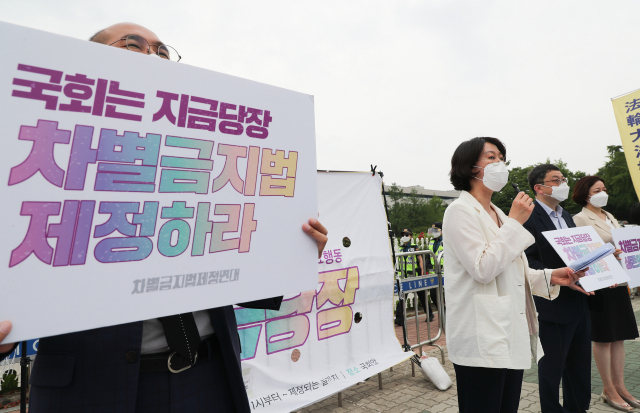A debate on anti-discrimination law is gaining momentum in South Korea with the support of scores of lawmakers, presidential candidates and members of the public.
Anti-discrimination bills that have been proposed several times since 2007 has never passed the National Assembly due to opposition from conservative politicians and religious groups. This time around the bill has stronger support from a broader spectrum in society.
Last week, 24 lawmakers from the ruling bloc, including the Democratic Party, proposed a bill on “ban on discrimination,” a year after a similar bill was proposed by progressive minor Justice Party in June last year.
The recent bill prohibits discrimination in all areas and effectively relieves damages caused by discrimination to realize human dignity and equality. It prohibits discrimination based on gender, disability, medical history, age, origin, ethnicity, race, skin color, physical condition, marital status, sexual orientation and gender identity.
The bill bans both direct and indirect discrimination that exclude or treat certain individuals or groups unfavorably. And, those who discriminate could be held liable for punitive damages.
If the bill is passed, the state and local governments should also adopt the purpose of prohibiting discrimination in various laws and policies, and the administration, legislature and judiciary should establish and implement a basic plan for correcting discrimination.
Separately, presidential hopefuls, including front-runner Gyeonggi Gov. Lee Jae-myung, former Justice Minister Choo Mi-ae, lawmakers Park Yong-jin and Yang Seung-jo, also spoke in support of the anti-discrimination law.
Gyeonggi Gov. Lee said in a statement on Saturday that he is “in principle in favor of” the anti-discrimination law. For more contentious parts of the bill, he said “a social consensus can be reached as much as possible through the elimination of misunderstandings, sufficient discussion, consultation and mediation.”
Public interest in the anti-discrimination law is also high.
According to the “2020 National Awareness Survey on Discrimination” released by the National Human Rights Commission in June last year, about 9 out of 10 respondents (88.5 percent) agreed to enact the anti-discrimination law.
A petition posted on the website of the National Assembly calling for an anti-discrimination law was also signed by more than 100,000 people between May and June. The petition will be reviewed by the National Assembly’s Legislation and Judiciary Committee as the number of signatories exceeded 100,000.
Some conservative politicians are still cautious about the enactment of the law.
Lee Jun-seok, the new chairman of the People Power Party, said in a recent radio interview, “I agree with the principle of dealing with discrimination extensively, but there is a lack of social discussion to reach the legislative stage.”
Lee said the conservative bloc needs to have an expanded discussion on various discrimination but the discourse is mixed due to differing religious beliefs within the conservative camp.
Over the past years, anti-discrimination legislation has been thwarted by some conservative politicians and Christian groups.
When Rep. Kim Han-gil of the Democratic Party submitted the bill in 2013 with the consent of 51 lawmakers, he withdrew the bill in two months due to strong protests from Christian groups.
Those opposing the bill have expressed their discontent through calls and letters of protest that have poured into the parliamentary office of lawmakers who proposed the bill last week.
Presidential front-runner and former Prosecutor General Yoon Seok-youl had also taken a cautious stance about the law during nominee confirmation hearing for prosecutor general in 2019.
When asked whether he agreed to the enactment of the law in a written question, Yoon said he agreed there should be no unfair discrimination in the society. However, in terms of enacting the anti-discrimination law, he said an in-depth review is necessary during the discussion as there are various opinions from all walks of society.
By Shin Ji-hye (
shinjh@heraldcorp.com)








